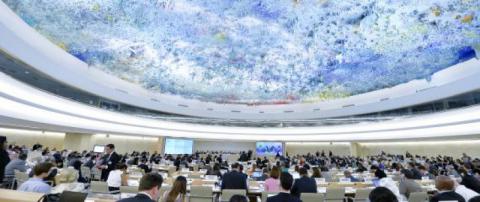
On 4 May 2016, Sudan's human rights records were reviewed at the occasion of the second cycle of the Universal Periodic Review (UPR). Many States raised similar concerns to those mentioned by Alkarama in its UPR submission particularly regarding the worrying state of freedom of expression, peaceful assembly and the widespread practice of torture and ill-treatment.
Acknowledging some of the challenges faced by Sudan, a country torn by years of conflict that caused thousands of casualties and forced the displacement of dozens of thousands civilians, Members States nevertheless urged the country to take effective measures regarding the promotion and protection of human rights.
What is the UPR?
The UPR is a United Nations Human Rights Council mechanism aiming at reviewing all UN Member States by their peers, on a 4-year cycle basis. Member States make recommendations regarding the human rights situation of the reviewed country which can then accept or refuse to implement them. Sudan had been first reviewed in 2011 and accepted the majority of recommendations made by other UN Members States.
Sudan's continuous deterioration of human rights
The mid-term assessment organised by UPR Info had shown however that many of the accepted recommendations had not been implemented, despite the adoption of a 2013-2023 national human rights action plan. During the review, many Member States underlined the lack of progress made by Sudan since the last UPR, particularly regarding the promotion and protection of civil and political rights.
"The review of Sudan at the UPR has shown that this country still falls short of many of its international obligations and that immediate actions, such as ratifying all core international human rights instruments and ending the harassment against journalists and human rights defenders, are urgently needed," said Thomas-John Guinard, Alkarama's Regional Legal Officer for the Nile. "We hope that Sudan will show its commitment to protect fundamental rights by accepting Member States' recommendations and effectively implement them in the coming months and years."
Several Members States recommended that Sudan creates a safe and enabling environment for the exercise of freedom of expression and of assembly, rights often violated by the authorities, as Alkarama had highlighted in its submission. In this sense, the travel ban imposed on several human rights defenders who wanted to participate in the UPR pre-session briefing in March 2016 was a clear indicator of the state of repression against activists and the disregard for freedom of expression in Sudan.
Another concern often raised by Member States was the need for Sudan to ratify the United Nations Convention on Torture and other cruel, inhuman or degrading treatment or punishment (UNCAT) and the International Convention on the Protection of All People from Enforced Disappearances (ICPPED) and to align its penal code with relevant international standards in this regard. Torture remains systematically practiced in this country, particularly by the National Intelligence and Security Service (NISS) which benefits from immunity from prosecution, another cause for concern to many Members States since this has led to a culture of impunity for human rights violations. Several delegations thus recommended that Sudan amends its National Security Act of 2010 which gives extraordinary powers of arrest, detention and seizure to this intelligence service, without any judicial supervision.
Member States also underlined the need to guarantee humanitarian access to conflict areas and to ensure that UN agencies and other international organisations can properly deploy their assistance there. Furthermore, some Member States recommended that Sudan sends standing invitations to all United Nations Special Procedures and to ensure the compliance of the recently created Sudanese Human Rights Council (SHRC) with the Paris Principles, a point also underlined by Alkarama in its submission. Regrettably, no Member State recommended the SHRC's accreditation before the Sub-Committee on Accreditation, undermining the possibility to better monitor its mandate and activities.
Finally, some member States urged the Sudanese authorities to comply with United Nations Security Council's resolution 1593 (2005) and of the need to effectively collaborate with the International Criminal Court (ICC) and ratify the Rome Statute.
For more information or an interview, please contact the media team at media@alkarama.org (Tel: +41 22 734 1008)
